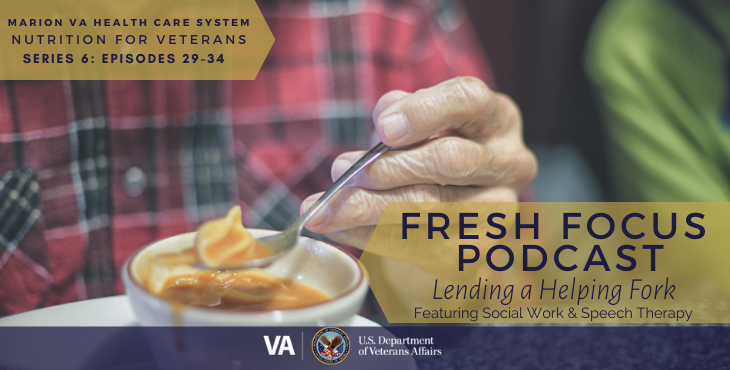Have you ever been sitting at the kitchen table with your Veteran loved one and noticed they may be having difficulty feeding themselves?
If so, then you will understand how hard it is to figure out your role as the caregiver when your Veteran needs additional support with eating their favorite foods.
There is no specific “diet” to follow when faced with a feeding problem. It’s just as important for all of us to eat a variety of foods and maintain a healthy weight. The Fresh Focus dietitians want you to know that we’re here to help and to support you in keeping your Veteran loved one at the table with us. We want the whole family to continue eating healthy meals with lots of colorful foods on their plate!
As foods begin to feel different, supplementing with a healthy smoothie recipe can help, giving the caregiver confidence the Veteran is still getting vitamins and minerals into their diet.
Goal #1: Positive experience. Let’s start with setting the dinner table for a positive meal experience. Favorite foods may change over time or from meal to meal. Some diagnoses can make memory and thinking skills decline, thus appetite, chewing and swallowing can become more difficult, along with other daily activities. In some instances, our Veteran loved ones may benefit from using an adjusted or adapted device at the dinner table.
Goal #2: Lend a helping fork. Certain items can assist Veterans who have poor coordination with feeding themselves. Some items, such as adapted plates or plate guards, can help make eating less work and more enjoyable for people who have difficulty feeding themselves. When our loved one has difficulty with utensils, it’s important to always place items within easy reach or gently assist using hand-over-hand assistance when needed. Some other items, such as bendable straws or even a sippy cup, can help, too.
Lastly, continue to offer their favorite food items, and learn to be patient with both ourselves and our loved ones.
Want even more tips? Listen to Fresh Focus Episode #30, as a Michele, a Marion VA registered dietitian nutritionist working at the Marion Community Living Center, shares her top 5 options around adaptive devices at the table.
Michele Martin MS, RDN, LDN, works at the Marion VA Healthcare System’s Community Living Center (CLC) in Marion, IL.
Topics in this story
More Stories
Watch the Under Secretary for Health and a panel of experts discuss VA Health Connect tele-emergency care.
The 2024 National Veteran Suicide Prevention Annual Report provides the foundation for VA’s suicide prevention programs and initiatives.
Theranostics is a specialized field of nuclear medicine that uses a two-pronged approach to diagnose and treat cancer.






